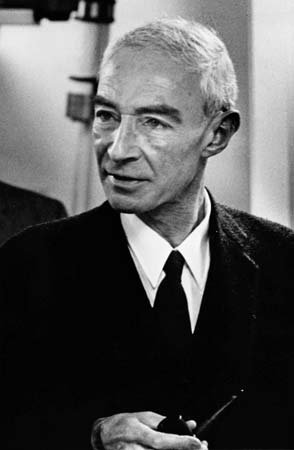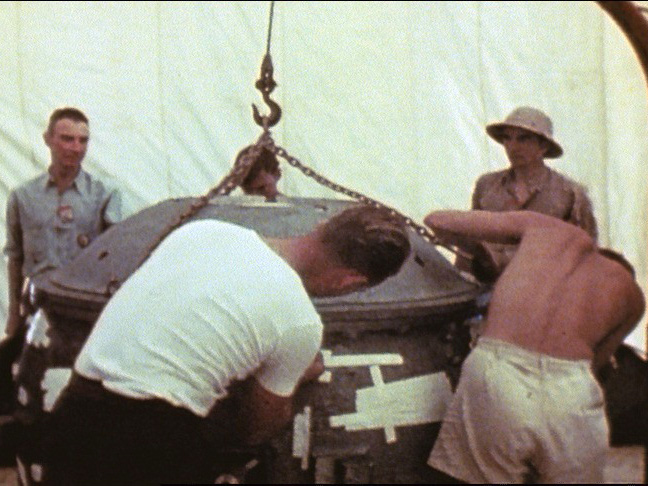Nuclear power, the most efficient power supply known by man. It is made by harnessing the power of fission, first found in the atom bombs developed by Julius Robert Oppenheimer. Oppenheimer was born on April 22nd 1904 and died on February 18 1967 to throat cancer. He was born to Julius Oppenheimer and Ella Friedman in New York. Oppenheimer's lead of the the Manhattan Project helped create the first working source of nuclear power. Through his leadership and will to end the war he helped complete the Manhattan project. He used his charismatic leadership style to help end the second world war through science and innovation and his advancements would eventually lead to one of the biggest advancements in the human era, so for these reasons he is a great hero.
 |
| (https://www.britannica.com/biography/J-Robert-Oppe (Courtesy of the Los Alamos National Laboratory, Ne)) |
Oppenheimer's leadership led the Manhattan project through all of its problems and was able to help develop one of the biggest advancements in the 20th century.During the war, "Oppenheimer did not direct from the head office, recalled the physicist Victor Weisskopf. "He was present in the laboratory or in the seminar rooms when a new effect was measured, when a new idea was conceived"(Julius Robert Oppenheimer." Dictionary of American Biography). He was able to lead by example and help without sitting around and waiting for others to do the work. He was charismatic and led others from beside them and not form an office chair. He was also very concerned about the powers development in the Manhattan project. "After the war, Oppenheimer became more and more concerned about the devastating potential of atomic weaponry. With this concern foremost in his mind, he co-wrote the "Acheson-Lilienthal Report," which opposed the nuclear arms race at its very outset, instead proposing stringent international controls on the development of nuclear arsenals" (J. Robert Oppenheimer." Notable Scientists). While Oppenheimer was crucial to the development of the Manhattan project he realized its potential and wanted to be regulated throughout the world. He wanted the powers to be properly regulated. Oppenheimer tried to make sure that people were going to use nuclear power safely. Oppenheimer took responsibility as a leader to make nuclear power not a weapon and to help power the world.
 |
| Oppenheimer with The Gadget(1st Nuclear Prototype) (http://www.atomicheritage.org/profile/j-robert-opp ()) |
Oppenheimer helped end the war through science and innovation in the field of particle physics. "Oppenheimer was one of a panel of four scientists including Ernest Orlando Lawrence, Enrico Fermi, and Arthur Compton that was asked to formulate an opinion regarding the use of the atomic bomb to end the war against Japan. They were told that there was a choice between a military invasion of Japan, which was certain to cost many American lives, and a nuclear attack on a military target that would also kill many civilians. Confronted with this choice, the panel voted to use the bomb" ("J. Robert Oppenheimer." Notable Scientists from 1900 to the Present) Oppenheimer weighed the costs of war and chose the choice that would cost less lives. He chose to attack through science to save civilian and military lives. "Oppenheimer began to hope that by making war unacceptably destructive, the bomb might force nations to live in peace." (Julius Robert Oppenheimer." Dictionary of American Biography) By helping make a weapon this powerful other nations would be forced to live in peace. This was the a different way to end the war than brute force. As stated in J. Robert Oppenheimer." Scientists: Their Lives and Works, "he led the U.S. effort, called the Manhattan Project, to build the first atomic bomb that was dropped in 1945 to hasten the end of World War II" Oppenheimer was one of the people who wanted the wars to end soon and he did it without brute force. He used his leadership and charisma to help end the war without direct conflict.
Robert Oppenheimer's leadership and charisma he helped to end the war through science and because of this he is a hero. Oppenheimer's leadership style incorporated charisma and leading by example. He worked with people instead of simply letting them try to figure it out by themselves. Oppenheimer is an inspiration to me because he led through charisma and by example. Oppenheimer's leadership helped lay the foundation for nuclear power, which is one of the most if not the most efficient power supply on earth.
Works Cited
"Julius Robert Oppenheimer." Dictionary of American Biography, Charles Scribner's Sons,
1988. Biography in Context, link.galegroup.com/apps/doc/BT2310006363/BIC1?u=powa9245&xid=9121683d. Accessed 12 Jan. 2017.
"J. Robert Oppenheimer." Notable Scientists from 1900 to the Present, edited by
Brigham Narins, Gale, 2008. Biography in Context, link.galegroup.com/apps/doc/.
K1619002454/BIC1?u=powa9245&xid=eb5ebad3. Accessed 12 Jan. 2017.
"J. Robert Oppenheimer." Scientists: Their Lives and Works, UXL, 2006. Biography in Context, link.galegroup.com/apps/doc/K2641500162/BIC1?u=powa9245&xid=06fc8aed. Accessed 19 Jan. 2017.
Page created on 2/8/2017 12:00:00 AM
Last edited 9/12/2018 6:08:31 PM
